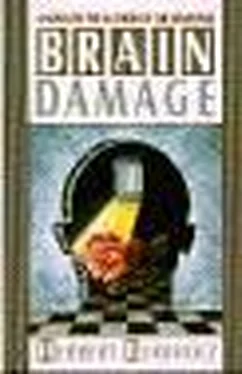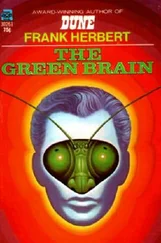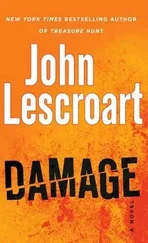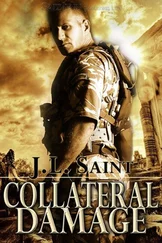We went back to the hotel to shower and change, and Manny and Bobby were ready to party. They had been on the job for a month, and they had some steam to blow. "You got to come along," said Bobby. His lips were loose and wet. "There's this place in the Quarter, they got bucking bulls and the girls with no clothes on."
Manny added, "They make great ribs, too."
I flashed a vision of Bobby drinking boilermakers in a cowboy bar and playing Henry the Eighth with a side of pork. I tried to look regretful. "Count me out, I'm beat. I really am. I need an early night."
"You can sleep tomorrow," said Manny. "Come on, you'll have a good time."
"Right now my idea of a good time is a broiled lobster and a bottle of wine, but I want them served in my room with the bed so close that I can fall into it."
"Chickenshit."
"That's me."
"We'll miss you." He gave me a tight smile. "Aside from playing God, you're also a bit of a snob, aren't you?"
"Just a bit, Manny, just a bit. I try not to let it show."
But I didn't get the lobster, I didn't get the wine, and I didn't get to sleep that night. An hour later Sammy Warsaw called from the Center and told me to get my ass up there. Sammy is like a brother to me, but he runs the Center now, and he tends to be peremptory. "No excuses," he said. "I want you here by noon tomorrow."
"Sammy, in case it slipped your mind, I just came off a job and my bones are breaking. Tomorrow I'll probably slide down to the coast, lie in the sun, and maybe try for some snapper."
"You'll be here tomorrow."
I figured the days. "Maybe Friday."
"There's a flight out of New Orleans in an hour. Be on it."
"Forget it."
"Do you want me to make it an order?"
I laughed. We don't give each other orders. "Now I know you're joking."
"No joke, I'm calling in the troops."
"All of them?" I couldn't imagine him recalling every one of the two hundred-odd aces that we have spread out all over the world.
"The senior aces," he said patiently. "You and Vince, Martha and Snake."
"And you." He was the boss now, but he still was one of us.
"And me," he agreed. "I want you all in my office at twelve sharp."
"What is it, World War III, or did somebody lose the key to the Men's Room?"
"All I know is that I got a call about an hour ago. I'm supposed to have the five of us on tap at noon tomorrow. There'll be some visitors from the Agency arriving about then."
"Delaney?" Roger Delaney was the Deputy Director for Science and Technology, and as such he controlled our finances, our security, and our assignments. He was the one person from the Agency who had access to the Center.
"Delaney and a few others." Sammy sounded unhappy.
"That's against the rules."
"I'm afraid that we're bending the rules this time."
"Then it has to be something hot."
"And you have to be here."
"You're a hard man, Sammy."
"Do you want this fucking job? You can have it, you know."
I hung up, and an hour later I was on my way home.
I have an apartment in Manhattan in a cold and sterile building, but that isn't what I call home. I have a cottage on the Jersey shore, but that isn't home, either. There's that Texas town where I was born, but it never was home to me, and never will be. Home is a state of mind, and mine is in the state of Virginia. To get to my home you leave Washington on Interstate 95 going south into the Virginia countryside for almost an hour. You pass the Marine base at Quantico, and leave the Interstate at Fredericksburg, following the state road southeast with the Rappahannock River on your left and the Nathan Bedford Forrest Military Reservation on your right. You skirt the perimeter of the reservation edging southward, and after three miles you turn onto a dirt road that is marked by a faded sign that reads: FEDERAL CENTER FOR THE STUDY OF CHILDHOOD DISEASES-AUTHORIZED PERSONNEL ONLY. From the turnoff you can see the first of the manned gates and the tops of the buildings beyond the fence. When I reach that turnoff, I know that I'm home. When you reach that turnoff, you've gone as far as you can go.
I left my rented car at the manned gate, and passed into the Center on foot. Inside me was a rolling excitement, a childish glee. It was birthday time and Christmas rolled into one, for this had been my home from the age of twelve, and coming back was like no other feeling in the world. Only Center personnel could clear the gate; Agency people stayed on the other side of the wire. On their side were the barracks, the motor pool, and the security headquarters; all squat and functional buildings. On our side was the fieldstone and ivy-covered structures of the Center: the separate living quarters for the aces and the students, the double-winged administration building, the mess hall and lounge, the long, low block of the hospital and research complex, the athletic fields and the swimming pools.
Sammy met me at the gate. He ran the place now, but he was guided by a courtesy long out of fashion. His greeting, however, was anything but courteous. The guard at the gate could have heard him, and so he spoke to me head-to-head.
Late, as usual , he said. What is it with you, can't you ever he on time? The others are up in the office.
Don't blame me, blame Delta. Are the visitors here yet?
Not yet. They're as bad as you are. Worse.
Any idea what it's all about?
He shook his head. I don't know any more than I knew last night. We'll find out soon enough .
What are the rules? No tapping? One of the many agreements that we had with the Agency people was that we did not go into their heads. It was a rule that we observed at our convenience.
Sammy shrugged. Use your own judgment. He was sore about them bringing in unauthorized personnel, and he wasn't trying to hide it.
We walked together up the tree-lined road that led to the administration building. It was a quiet day, and the only noises that came to us were those of the birds, and the shouts of a faraway group of kids on the soccer field. The place looked more like a small-town college than anything else, and with good reason. No matter what the signs said, our side of the wire had only one function, the study and training of sensitives. The Federal Center for the Study of Childhood Diseases was a fiction to discourage the curious, and the actual workings of the Center was classified information. Aside from our own people, only a selected few in high places knew of the existence of the Center. It was the same with all the other countries that used sensitives: the research center was always affiliated with the intelligence branch of the government. It had to be that way. In our case the budget of the Center ran into more money than any institution in the private sector could handle. Only the government could afford to pick up the tab, and that meant the CIA. The Agency and the Center were joined hip and thigh in a relationship that was often strained, but never had been broken.
The layout of the Center showed the nature of that relationship. We were on the inside of the fence, and they were on the outside. They were very much in control. In exchange for all the money, in exchange for the Center, in exchange for our very existence, we worked for them. They owned us, every single one of us.
"The kid," said Martha, "is a monster. I'm sorry to have to put it that way, but that's what he is. A monster."
"The kid," said Vince, "is a kid. And all kids are monsters."
"Not like this one. He's truly nasty."
"He'll grow out of it," said Snake.
"He refuses to study."
I said, "Motivate him."
"He disrupts the class."
"Apply peer pressure."
"And," Martha made her final point, "he's a terror with the girls."
Читать дальше












